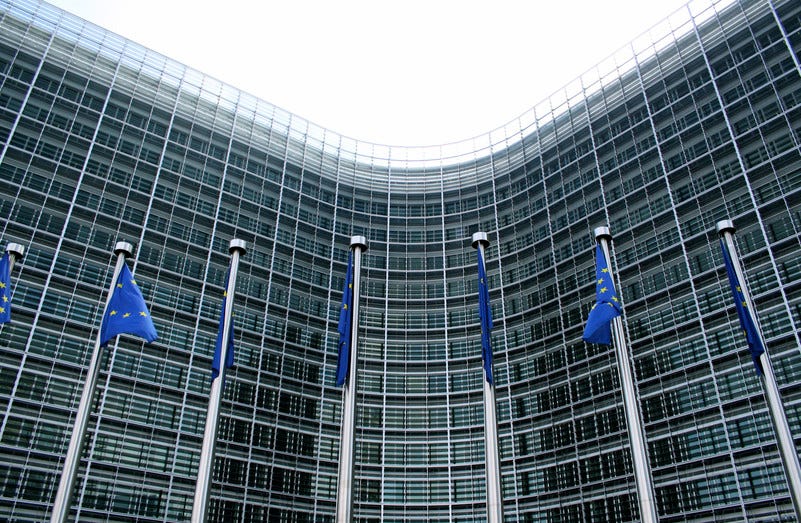Seeing like a state
Trying to find some new ideas about the pandemic
Anyone tired of the pandemic? Just kidding.
Here’s the thing, though.
If it doesn’t sound too obnoxious, I think of myself as someone who understands things.
Not everything, of course. Not every corner of psychology or every metaphysical mystery. But I pay attention. I might never become an expert on Myanmar, for example, but I have enough basic knowledge that if I follow the news and read a few books, the situation ends up making a kind of sense. And the more I read, the more sense it makes.
So I’ve been astonished by the pandemic. I have seldom read more about any subject. And it does not make sense.
We all tend to view this story through the prisms of our own countries. I’m lucky, if that’s the word, to follow it in several countries. I follow it in the United States. I follow it in the Netherlands, where I have lived for a long time, and in France, ditto, and in Germany, where my sister lives, and in the UK, where much of my social and professional life takes place.
(I also, alas, follow it in Brazil, but that is a separate subject. Brazil is stuck with an actively malevolent government, which was not the case in these countries. Even Trump contributed far more than most left-wing Americans feel comfortable admitting, namely by throwing billions of dollars at vaccine research.)
One thing I understand about all these countries is their particular weaknesses. The intellectual sclerosis of the Dutch. The preachy know-it-all-ness of the Germans. The scoffing unseriousness of the British. The love for conspiracy theories of the French. And, of course, the complete batshitness of the Americans.
Yet for all their foibles, we always thought of these countries as among the best organized, wealthiest, and most powerful in the world. Why haven’t they done better?
You’ll give a different answer depending on where you live.
If you’re in France, you focus on the prissy Macron, consulting his witch doctors and getting his minions to tell Le Monde, off the record, that he has a truly breathtaking command of epidemiology. If you’re in Germany, you say: Poor Angela is constricted by the impossibility of enforcing a lockdown in all 16 Länder, but I am nonetheless comforted by the grimness of her mien. If you’re in the Netherlands, you say (always): We’ve done such a great job! If you’re in Britain, you say: Boris Fucking Johnson — unless, of course, you voted Leave, in which case you say: if we hadn’t voted Leave we’d all be dead. If you’re in America, you say: Donald Fucking Trump.
At different times, different places have seemed to be “doing better.” Last year, when Trump was in the White House and there were bodies piled up in the streets of New York, I was unspeakably relieved to be in Europe. This year, as I flip through pictures on Instagram of American friends celebrating birthdays and eating in restaurants (!), I wish I was in New York.
But the simple fact is that no matter what month it is and no matter where you are, what these countries share is failure. The states you would have thought were best prepared failed. They often did worse than countries that were, on paper, far less prepared.
This is what I didn’t understand. Why?
The other day, I was listening to my favorite podcast, Aufhebunga Bunga. This podcast features leftist thinkers who are not the usual leftist thinkers. This one was about, yes, Myanmar, and I was interested because it featured Lee Jones. I first learned who Jones was a couple of years ago by reading the website The Full Brexit.
To explain: I would never have voted for Brexit. I was appalled by Brexit. If Nigel Farage and Boris Johnson and Rupert Murdoch and the Tories are for something, I am naturally, automatically against it.
And yet. I have long been a Eurosceptic. Besides the convenience of being able to travel from one country to another without border checks, the European Union has long seemed awful. Rather than taking ten thousand words to explain why, let me just introduce you to its architecture.
European Commission Headquarters
European Parliament, Brussels
You could be forgiven for thinking that you were looking at a pharmaceutical headquarters in a New Jersey office park, or at a Hyatt Regency at DFW Airport. And if you suspect that a bureaucratic, corporate monoculture is housed within these buildings, you would be correct. It’s anti-democratic architecture, and the EU is anti-democratic, with countries (read: Germany, with an always-enthusiastic assist from the Dutch mini-me) constantly telling elected governments in other countries what to do.
(By a coincidence that is not a coincidence, I just looked down at my phone and there’s a news alert from El País:
“Germany demands that Spain present a plan of fiscal adjustment to tackle the public debt.”)
As a democrat, I have always believed that elected governments ought to be responsible for things like public spending. I think that Spain’s government, and not Germany’s, ought to determine what is best for Spain. If this sounds obvious, you have not spent much time in the European Union, where this has been usually considered a radical and even anarchistic view.
And if you want to know what this kind of anti-democratic government looks like, just spend a few minutes reading about what the European Union did to Greece. They took a middle-class country and reduced it to beggary. Greek voters were considered an irrelevant nuisance.
During the Brexit debate, the right wing had taken over the argument. I was interested in what the left wing had to say, and Lee Jones’s writings about restoring a direct connection between voters and their governments seemed very convincing.
If I didn’t entirely endorse them, it was because I wasn’t sure that anything better would replace the EU. In Britain, it seemed that it would further empower the right wing—and that, so far, is what has happened. But I was interested in the debate. I still am.
Anyway, I tuned in to listen to Lee Jones. I learned a lot about, yes, Myanmar—I didn’t realize that was his area of academic specialization—but what I was really interested in was hearing him discuss this article, “COVID-19 and the failure of the neoliberal regulatory state.” Here’s the mystery he and his coauthor, Shahar Hameiri, set out to solve. It was the same one I had been busting my head over all year.
Especially in the first wave, the ‘advanced’ countries of Europe and North America fared worst, despite ostensibly being best-placed to withstand a pandemic. The World Economic Forum’s Global Security Index had ranked the United States and Britain as the best-prepared in the world, but by mid-2020 they had performed worst. Similarly, an ‘Epidemic Preparedness Index’, published in the prestigious British Medical Journal, had placed the US, Britain, Italy, Spain, France and Germany in the ‘most prepared’ cluster, yet these countries experienced some of the world’s worst death rates. Many also performed very poorly in the second wave, during the northern hemisphere’s winter. In Britain, as of 12 January 2021, the number of infections and deaths per million population remained the fifth and eighth highest globally. Meanwhile, the US had the highest number of confirmed COVID-19 infections of any country on Earth, over 22 million, and the eleventh highest death-rate, with more dying daily than were killed in the terrorist attacks of September 11, 2001.
With all the focus on the staffage of different political institutions, it becomes hard to see what these places have in common. Jones speaks about the difference between the state—the permanent institutions that keep things running—and the government, the people who are in office at any given time. People pay attention to the government: elections, personalities, scandals. They tend to ignore the state. And then a pandemic emerges. Suddenly they discover that huge industrial countries like the United States, Britain, or Germany can’t even manufacture enough face masks.
Jones and Hameiri explain this by describing the shift from the “regulatory state,” and from “government” to “governance.”
[This] entailed key pathologies, including: the deliberate reduction of popular expectations of public authority; the outsourcing of responsibility to technocratic, private and quasi-autonomous actors, weakening lines of control and accountability; and the hollowing-out of state capacities and authority to the benefit of frequently inept large-scale corporations.
As I was reading this article — I’m not going to sum it up because, though it’s academic, I really want to encourage you to read it for yourself —a wave of relief washed over me. Not because I thought any of this was good news, but because I felt that I was starting to understand something that had eluded me throughout the year.
Of course, it’s not just in the last year that we’ve seen this. It’s been the dominant ideology of my entire life, in both Europe and the United States.
I think I was always skeptical of it because of my experience in Latin America. Does anyone remember all the “Harvard-educated” guys who turned up in Latin America in the eighties and nineties? They had really nice suits. They spoke really good English. (One President of Bolivia spoke English far better than he spoke Spanish.) They were going to rationalize and privatize and streamline the “cumbersome” state and encourage “entrepreneurship.” A new currency here—a reduced tariff and a structural adjustment and a personalized pension account there—and Latin America would blossom.
Latin America … did not blossom. No more than Greece blossomed under the tutelage of the kinds of people who worked in buildings like the ones pictured above. The price paid was often ghastly.
Yet it wasn’t that ghastly in Western Europe and North America—among certain classes. Here in France, for example, there would be a rumbling of the gilets jaunes—whose demands, if they could even be called that, were so vague that they could be dismissed as the racist rants of people with tacky haircuts. They were going to burn down the Champs-Élysées because their bus service got a bit more infrequent?
But the reality was that many people’s lives were getting worse and worse—harder and harder—year after year. And they didn’t have any representation that could advocate for them. So they gravitated to the extremes.
Meanwhile, for people like “us,” the children of globalization I wrote about a few weeks ago, everything seemed fine. We hadn’t been forced to notice that the states in which we lived had been eviscerated. We were too focused on today’s episode of the local Netflix series—Did Mark Rutte lie about wanting to get Pieter Omtzigt out of the new cabinet?!—to see the shared drama. That was a shift of power away from the voters, one of which certain neoliberal politicians boasted:
What governs our approach is a clear desire to place power… not with [elected] politicians but with those best fitted in different ways to deploy it. Interest rates are not set by politicians in the Treasury, but by the Bank of England. Minimum wages are not determined by the Department of Trade and Industry, but by the Low Pay Commission. Membership of the House of Lords will be determined not in Downing Street but in an independent Appointments Commission.
It’s often said that neoliberalism is a vague and disparaging term. It’s not. It describes a specific ideology, one of whose characteristics is precisely what the British minister quoted above describes: the shift of power from elected representatives to faceless banks and commissions.
I’m glad to see it described. What we are going through now is an intellectual crisis more than a public health crisis. It’s up to intellectuals to articulate a response. If we rise to the challenge, it’s an exciting time.
I’d love to hear from you in the comments!
Speaking of intellectual debates: Last week I was thrilled to announce the birth of Clarice Lispector’s An Apprenticeship or the Book of Pleasures in English. I featured Sheila Heti’s beautiful essay on it, which was also published in The New York Review of Books. They also published a wonderful interview with Sheila that I recommend.
That same day, we got the review in The New York Times that we all dream of. Audrey Woolen wrote:
Lispector’s writing is like glass: granular detail turned to liquid under impossible heat, and then hardened and crystallized into a wet, new thing. Its fragility requires a certain patience to handle; it always feels on the edge of shattering. It turns the sky into a kind of object. It welcomes the light.
But remember how I said that I was afraid that Clarice might get cancelled for writing this book? Well, Marshall Shord in The Southwest Review absolutely hated it, for all the reasons I knew some people would.
As a romance, An Apprenticeship is unconvincing. As a philosophical novel, its ideas are lacking and repeated without development. Its actual achievement is something else entirely: it paints a startlingly accurate portrait of a real creep.
I don’t think I’ve ever drawn attention to a negative review of a book I’ve published, but I do so now because, though I don’t think Shord is right, I also don’t entirely think he’s wrong. This book has always made people uncomfortable.
I never forgot a line from a biographer of Beethoven who was trying, and failing, to understand a dreadful composition by a great genius. He wrote:
When you find a flaw in a great master, you must first seek that flaw within yourself.
This is excellent advice. But I also don’t think that great masters should be placed on a pedastal. I think it’s good when people engage their writing. I think it’s the sign of a healthy literary culture for people to question even the great masters. It keeps those masters alive.
Clarice Lispector is always a challenge. She forces us to read and to think differently—even, as I have often written in the past, on the level of grammar and syntax. I’d encourage you to get a copy of this book and tell me what you think.
In other news, my sister has a fabulous piece in The New Yorker about our family history in America and Germany.
And in still other news: I talked to the Our Struggle podcast for two hours the other day. Lauren Teixeira and Drew Ohringer and I discussed one of my favorite topics, which is the connection between the personal beauty and writing. It’s something that comes up inevitably when you write biographies of women who also happen to be famous beauties. Coincidence? (Hint: no.) What do we see when we see someone as beautiful? This was one of the most fun podcasts I’ve ever done, so if you haven’t heard enough from me, please tune in.
Finally, I would like to thank everyone who has upgraded to a paid subscription. I wanted to wait a bit before introducing some subscriber-only features, and thinking about what form I want this to take. I have some fun ideas, I hope. So if you are enjoying these emails, please consider clicking below:





This is big food for thought Ben. The neoliberalism from the 70's/80's started by Thatcher and Reagan has led us to this point in terms of how well our Western countries were able (or not) to deal with the pandemic. Whereas Japan, Hong Kong, and Singapore and China did much better through their strong social and health systems. Capitalism is at the root of it. To say this has been a year of thinking and analysing about the 'why' would be an understatement. For me it was looking through the prism of European social safety net to the home country where there is no safety net (and individualism/self reliance is a cherished trait) in a way I had never looked at it before. Thank you.
One of the reasons I count myself among your faithful readers here and elsewhere is the apparently inexhaustible flow of worthy voices/writers to whom you regularly introduce us, Lee Jones being just the latest you've put on my radar!
Are you familiar with the UK writer Richard Seymour? He's in the Verso/Jacobin axis; has written some very good books on politics and culture (lately with an unexpected but well-deployed and interesting psychoanalytical lens overlaid); and his commentary was the best guiding light for me regarding the "Lexit" thinking it seems Lee Jones is good at articulating. (Though Seymour ultimately came down anti this Brexit, it's only for the reasons you mentioned here in your post, that it was a right-wing Brexit. But he's great on how exempting one's nation from the European Union of Neoliberal Austerity is hardly an objectionable idea to a conscientious leftist.)